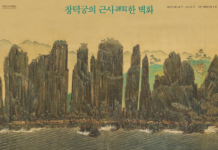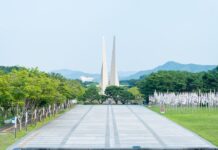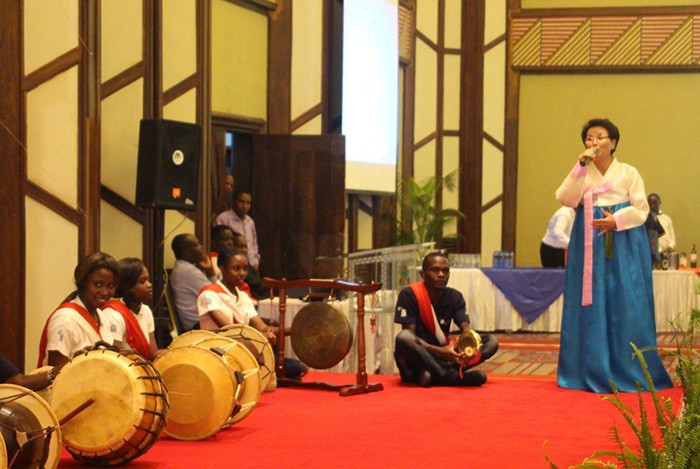
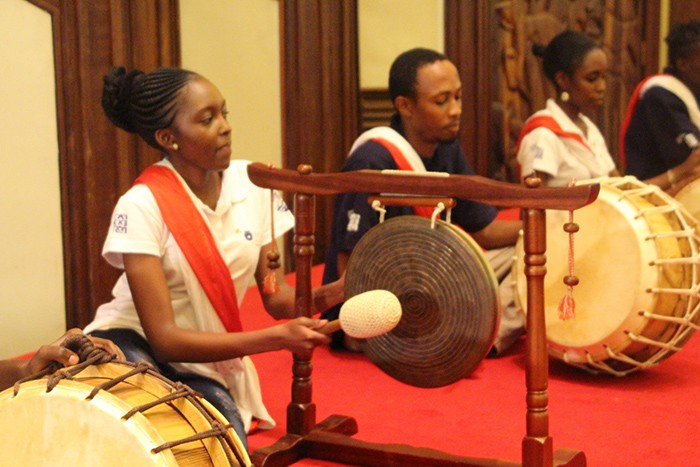
Students from the King Sejong Institute in Nairobi play traditional Korean musical instruments and give a samulnori percussion performance to mark the ‘Day With Korean Culture Abroad’ on May 26 in the Kenya capital.
More than 200 people gathered in a banquet hall at the Safari Park Hotel in Nairobi on May 26, enjoying the luscious greenery of the hotel grounds.
They were there for the “Day With Korean Culture Abroad,” a local festival organized by the King Sejong Institute in Nairobi. Both traditional and contemporary Korean music was performed, and a range of delicious food was on offer, too. There was warm, steamed rice, tteokguk rice cake soup, injeolmi pounded rice cake and tasty rice cake with a red bean filling. Kenyan chefs were busy making gimbap rice rolls and pajeon savory pancakes, too, showing off their expertise with Korean cooking.
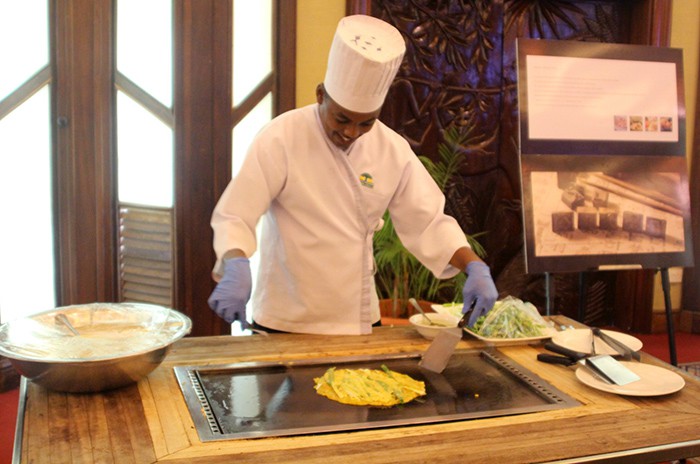
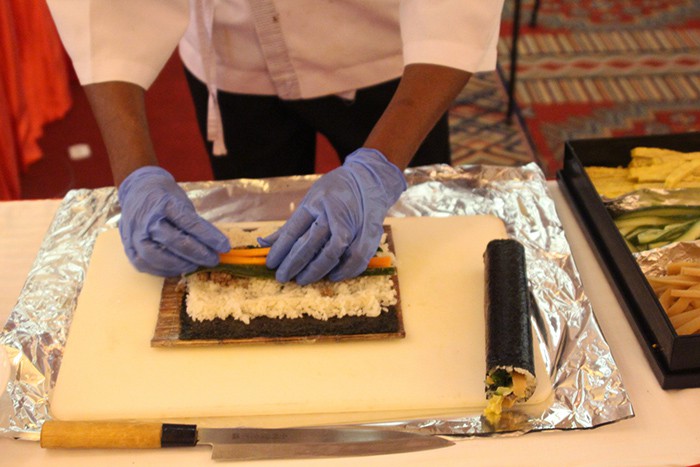
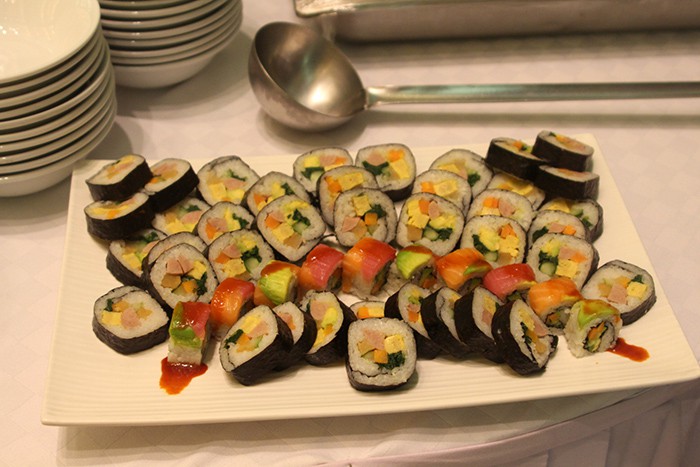
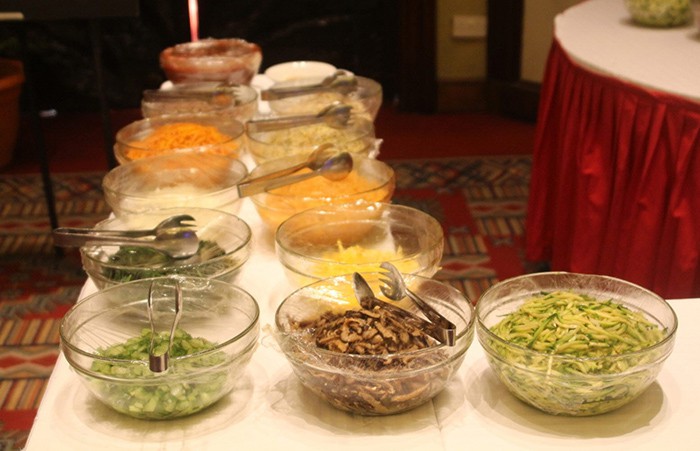
Kenyan chefs prepare some Korean delicacies, such as gimbap rice rolls and pajeon savory pancakes.
The samulnori drum show was only a precursor to the main event. Traditional Korean percussion instruments, such as the janggo hourglass drum, gongs, large metal jing cymbals and smaller kkwaenggari gongs created true sounds of harmony, impressing and amusing the audience. All of the performers were students at the King Sejong Institute. Though not professionals, their passionate for the music moved the audience as they basked in the many flashbulbs.
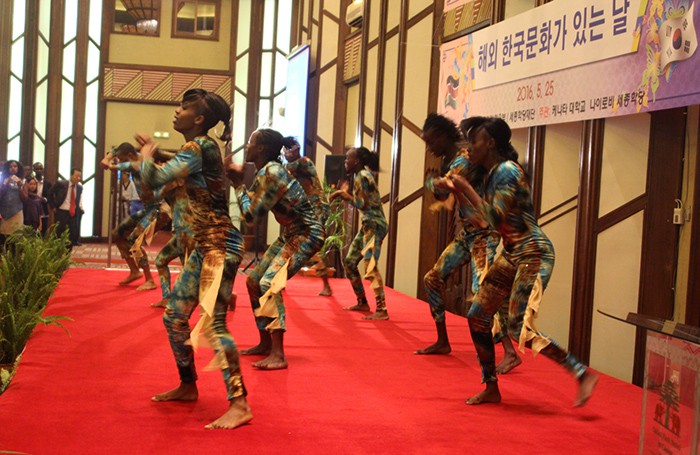
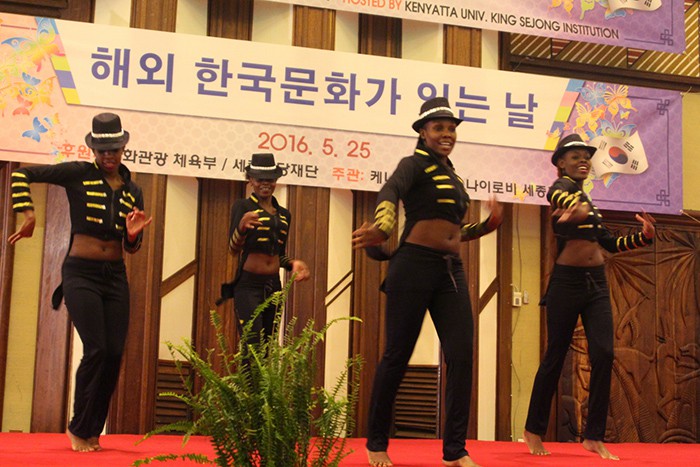
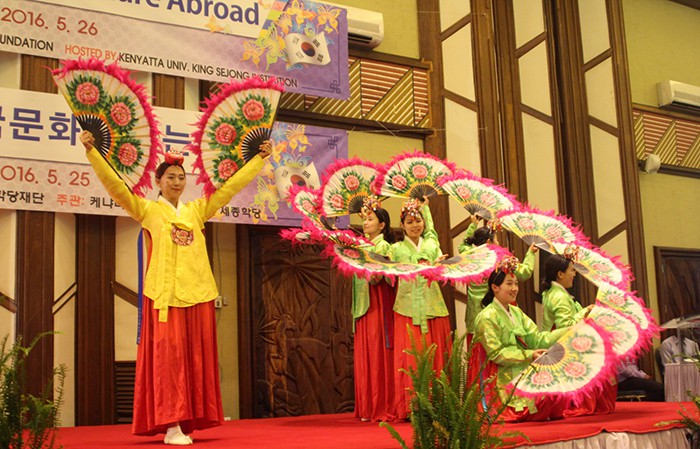
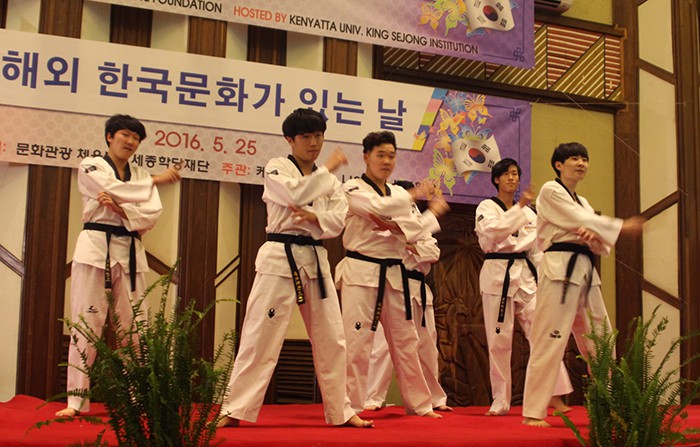
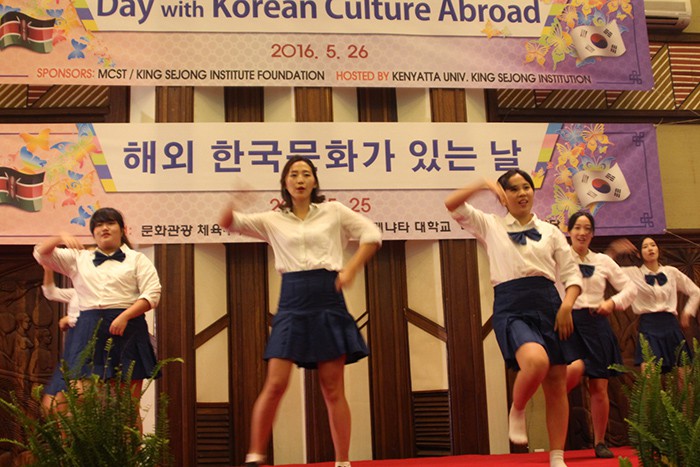
Korean and Kenyan students dance during the ‘Day With Korean Culture Abroad’ in Nairobi on May 26.
Dance troupes composed of Kenyan students performed to some of the newest K–pop songs. They showed off their rhythmic and dynamic, yet flexible, moves to the song “Gangnam Style,” making only few changes to the original Horse Dance, which won great applause from the audience. Next up was a troupe of Korean teenagers who performed a traditional Korean fan dance and also danced to some K-pop songs, really exciting the audience. Another unmissable act was the taekwondo demonstration. The athletes combined dancing with their martial art moves, making it look more like a street dance rather than a strict physical discipline.
After the show, everyone gathered there was able to enjoy the prepared feast. They queued up to sample the abundant amount of food on offer, with satisfying smiles and making friendly chitchat among themselves.
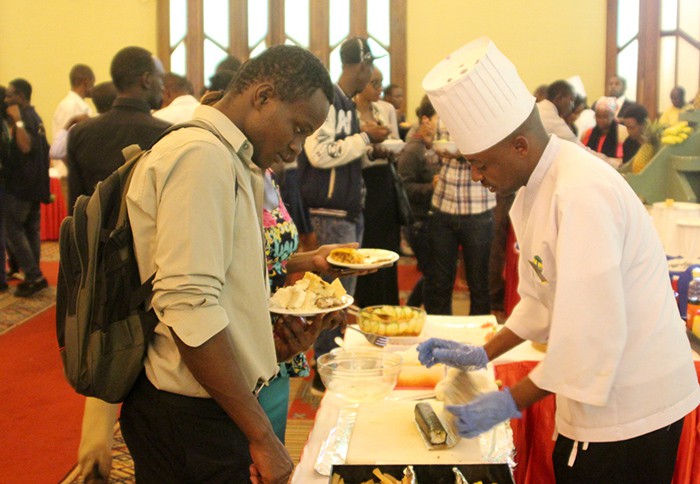
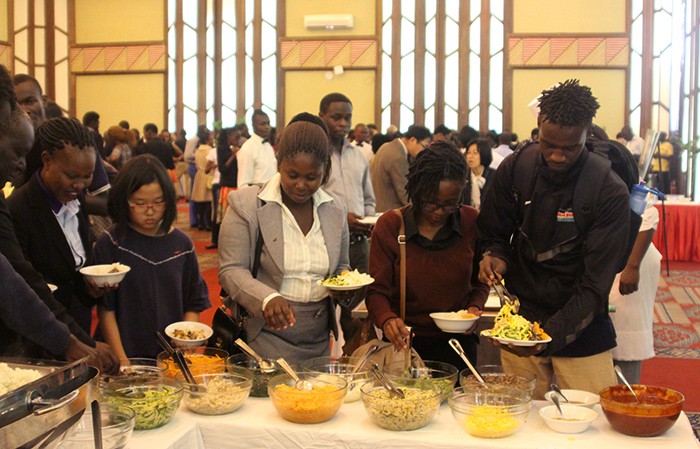
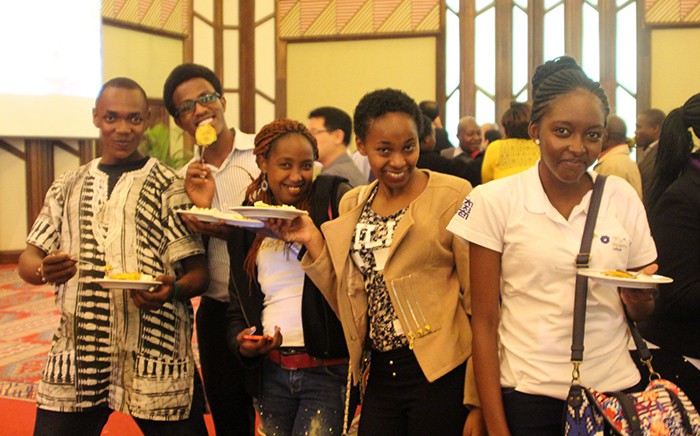
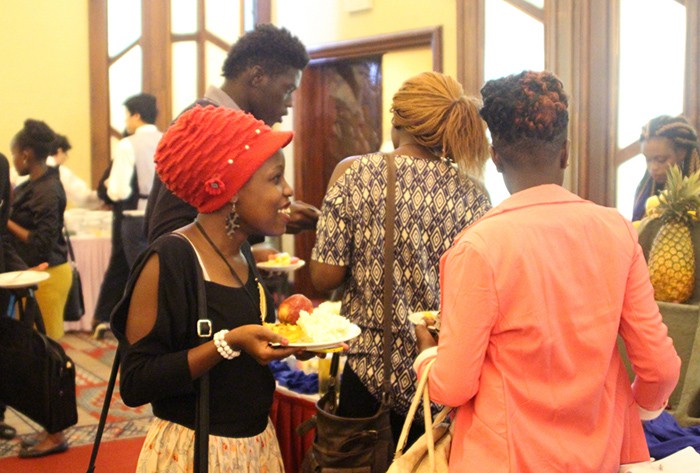
Visitors to the ‘Day With Korean Culture Abroad,’ a local festival organized by the King Sejong Institute in Nairobi, enjoy all the different kinds of Korean food on offer at the event.
Lynne Imali Kazi, a student majoring in Korean studies and political diplomacy at the University of Nairobi, said, “My dream is to start a translation and interpretation firm to do business between Korea and Kenya.”
Kazi said that she’s from Kisumu, Kenya’s third-largest city, and that earlier in the day she had received her test results for the intermediate Level Four TOPIK (Test of Proficiency in Korean) test she had taken earlier in the month. Considering her TOPIK results, she could easily live in Korea without any difficulties. This is also thanks to the four trips to Korea trip that she has made, organized through the King Sejong Institute, and thanks to having studied Korean at Hanyang University.
Not too long ago, Korea and Kenya were somewhat far apart. However, nowadays the two nations are quite closer. This is thanks to the tremendous endeavors of Kim Eung-su, principal at the King Sejong Institute in Nairobi, which only opened its doors in September 2011. Kim previously worked as a fighter jet pilot for 28 years, and then worked as an executive at a Korean conglomerate. Just by chance, he came to Kenya.
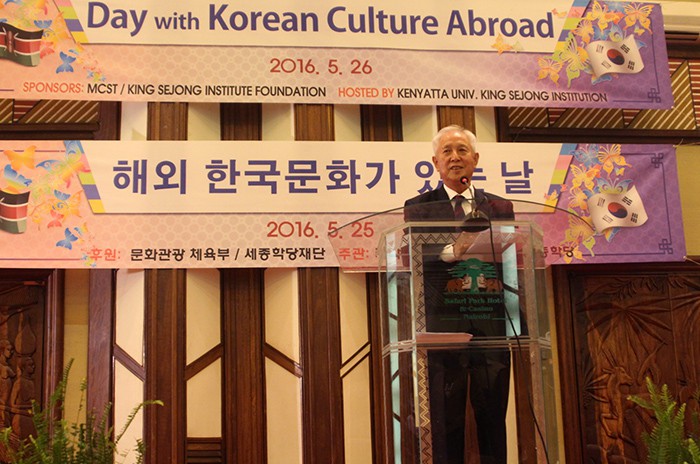
Kim Eung-su, principal of the King Sejong Institute in Nairobi, emphasizes the importance of enhancing cross-cultural exchanges and cooperation, during the ‘Day With Korean Culture Abroad’ festival on May 26 in Nairobi.
Kim is Roman Catholic and volunteered at a night school run by the Roman Catholic Church for expatriates and migrant workers. While volunteering, he met many Kenyan expats in Korea. Many of them lived in Paju and Munsan in Gyeonggi-do Province, but they experienced difficulties due to language barriers and cultural differences. One Kenyan resident even told him to come to Kenya to teach Korean. So in 2008, Kim went to Nairobi on his own to build a school and to teach Korean. Three years later, that school became the King Sejong Institute. Now, the institute teaches about 30 students every semester, which lasts six months. So far, more than 700 students have studied at the institute.
Among those, more than 60 of them have since studied in Korea and received full scholarships from Korea, Ewha and Sookmyung Women’s universities. Some of them have also studied at vocational schools run by the Seoul Metropolitan Government. Finally, some others even work at Korean companies.
One of the motivations for many of the students to learn Korean is to rise from poverty and to learn about Korea’s successful experiences at economic development and democracy.
Ha Tae Hyun, principal of the Mahanaim Educational Institute, said, “Kenyans have a strong passion for education, similar to Koreans in the 1960s and 1970s. They want to educate their children, despite difficult economic conditions.” Koreans and Kenyans have now become true neighbors by studying, playing and enjoying food together.
By Wi Tack-whan, Yoon Sojung
Korea.net Staff Writers
whan23@korea.kr






